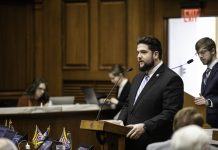By John Krull
TheStatehouseFile.comÂ
MUNICH, Germany – The last time I was in Munich I saw a guy who was the spitting image of my younger brother.
This was decades ago, in the mid-1980s, when I went to the Oktoberfest. I saw the young man in one of the festival’s great beer tents.
Same hair. Same deep-set eyes. Same jawline, cheekbones, and nose.
A dead ringer.
If I hadn’t known for a fact my brother was still in school back in the States, I’d have sworn he’d followed me over to Germany.
It either was a tremendous coincidence – of the sort found only in Mark Twain novels and Walt Disney movies – or, somewhere, generations back, we shared a common German ancestor whose genes had been especially tenacious. My father’s family came to America in the late 1800s as part of the great wave of European immigration
I was tempted to try to strike up a conversation with the guy who looked just like my brother to find out his name and where he was from. Two things stopped me.
The first was that my German doesn’t extend much beyond “bitte,†which means please, and “danke,†or thank you.
The second was that the young man clearly had hit the heavy Oktoberfest brews early and hard. He looked more than a little worse for the wear. He might not have been able to understand me even if my German had been as supple as Goethe’s.
Still, I walked away from that moment feeling as if the past had spoken to me, pondering the whims of time and destiny that brought me into contact, so far from home, with someone with a portion of my family’s blood in his veins.
My wife, children and I came back to this lovely German city after spending Christmas in Paris. In the City of Lights, we traipsed over streets my late father-in-law strolled as a boy. His family lived in Paris in the 1930s, and that’s where he started school.
They left the city in 1939, among the lucky ones who got out before the Nazis occupied Paris. My wife’s paternal grandfather and his two brothers had fought on the frontlines for France in World War I. One of them at one point had been trapped under a mound of dead and shattered bodies after a shelling. None of them wanted to expose their families to such horrors up close.
My father-in-law was but a boy when his family settled in the United States.
He grew old enough to serve in the Navy at World War II’s end because some dangers we cannot escape, no matter how much parents might wish their children could.
My father-in-law came home, built a life in New York, married and fathered four children. His first-born became my wife, the mother of our two children.
During these past months, our daughter has studied in England and Scotland. Long, long ago, my mother’s people lived there. Our ancestors, after being transplanted to Northern Ireland, came to what then were the American colonies in the mid-1700s. Desperate to stake out lives they could call their own, they fought in the American Revolution and helped forge a nation.
My daughter’s time in Britain whetted her appetite for family history. Around her studies, she managed to unearth stories of my mother’s people I’d not heard. She rediscovered almost forgotten links in the family chain.
Now, as I amble the streets of this old German city, I find myself wondering what happened to the guy who looked just like my brother I saw in the Oktoberfest beer hall so long ago.
I think about my father’s grandfather coming to America in search of work. About my wife’s grandfather fleeing to the States to keep his family alive. About my mother’s people who crossed an ocean and fought a war to be free from a crown’s control.
So much searching.
So much history.
And now my children walk earth their ancestors, once upon a time, left behind.
We live in a world of mystery.
Too often, we don’t even realize it.
FOOTNOTE: John Krull is director of Franklin College’s Pulliam School of Journalism and publisher of TheStatehouseFile.com, a news website powered by Franklin College journalism students.




